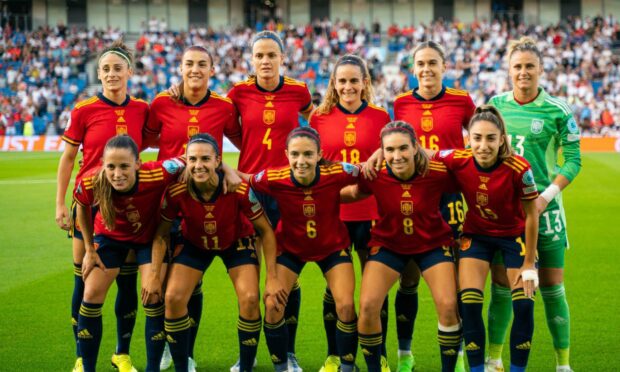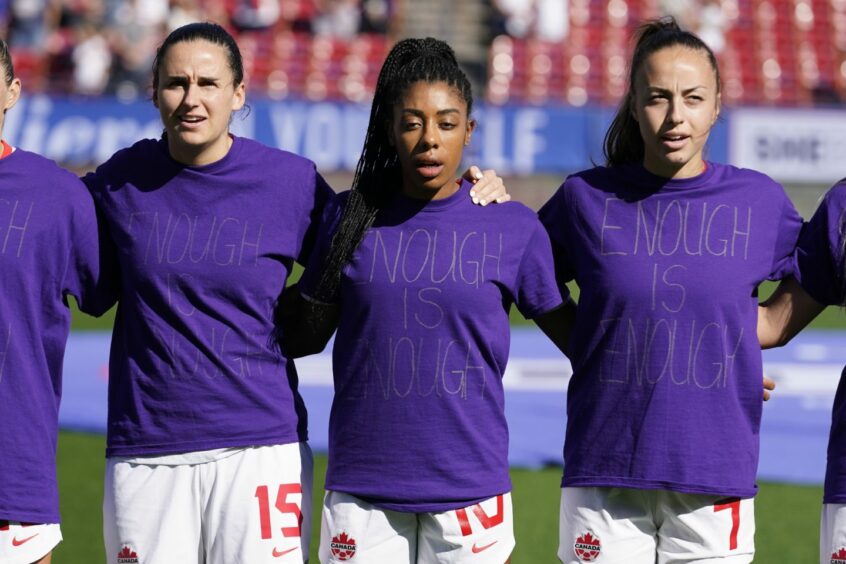Spain’s provisional squad for the Women’s World Cup was released earlier this week and there were notable inclusions and absentees – linked to a rift with the Spanish FA.
In September 2022, 15 Spanish players wrote to their federation and made themselves unavailable for future selection due to concerns about their coach Jorge Vilda.
Only three of those 15 players – Aitana Bonmati, Ona Batlle and Mariona Caldentey – have been recalled and named in Vilda’s preliminary 30-player squad ahead of next month’s tournament in Australia and New Zealand.
A big inclusion was Ballon d’Or winner and Barcelona midfielder Alexia Putellas, who had not been one of the 15 players involved in the dispute, due to being injured at the time.
It is really powerful and brave to put yourself in the firing line by taking on the powers that be like some of the Spanish players have done over the last nine months.
Last year, the Scotland Women squad announced we would be taking legal action against the Scottish FA in order to address what we consider long-standing issues of inequality in our pay and conditions.
As a result of this, I can sympathise with what the Spain squad are going through – it is an uncomfortable position to be in and not a step players take lightly.
If players, like myself, have chosen to speak up, there is a reason for it, and often people don’t take a second to realise this.
We do it because as players – especially those of us who have been a part of the game from when it was still considered “amateur” – we feel a duty to be the people driving the game forward in the right direction.
In recent times, Spain and Scotland are not the only national squads to take action – France, Canada and the United States have also sought change.
And on Thursday, Jamaica – known as the Reggae Girlz – expressed their “utmost disappointment” at what they consider “subpar” support from their federation ahead of the World Cup.
Emotionally and mentally, it can be a challenging place to be. I can empathise with the Spanish players who are going to the tournament and those who are not.
Difficult conversations will have been had, but with situations like this you have to respect every individual’s choice as they have done what they feel is best for them.
With our national team, we’ve had a lot of conversations and collectively we have always been together and tried to be reasonable. I’m really grateful for that because I can only imagine how conflicting it is to be in a Spain squad which seems divided.
The Spanish squad still feels fractured, but even with notable players missing, they are going as one of the best teams in the tournament.
Spain are still collectively good enough to reach the latter stages of the World Cup.
Still though, it is just sad these conversations are needing to be had ahead of what is going to be the biggest Women’s World Cup there has ever been.
World Cup player payments a game-changer from Fifa
Last week, it was confirmed Fifa would, for the first time, be paying individual players for their participation at the upcoming Women’s World Cup.
The money is dependent on how far the teams go in the competition. The players in the winning team will receive £217,000 each, while, at the other end of the scale, players from teams who only play in the group stage will earn £24,000.
It is a fantastic deal which has been struck thanks to the work done by players’ union Fifpro.
And I know other fantastic work, which often doesn’t grab the headlines, has been done by the union to ensure standards are being met in other areas.
Fifpro have fought hard to push Fifa to make much clearer guidelines and requirements for teams – such as playing resources, travel and accommodation, so players and staff are being properly looked after at tournaments like the World Cup.
The new payment model is amazing for players, some of whom will now earn more for playing at the World Cup than they would with their respective clubs.
Fifa are at the top of the tree and what they push for in the women’s game will make a much bigger splash and much quicker than anyone else. By valuing the players, hopefully other organisations and clubs continue to follow suit.
This is what global collective action looks like 🙌
When #FIFPRO, member unions and over 150 women's national team players from 25 countries worked together, they delivered this letter that has changed so much in women's football. pic.twitter.com/a0AuLq88yX
— FIFPRO (@FIFPRO) June 9, 2023
BBC and ITV strike World Cup deal
It has taken a while, but I was delighted when it was confirmed earlier this week that the BBC and ITV have secured the rights to broadcast the World Cup.
The tournament is going to be the biggest it has ever been, with more than one million tickets already sold, and the broadcast deal means everyone will have the chance to watch all 64 games on free-to-air TV.
The negotiations have been ongoing for a while with Fifa president Gianni Infantino accusing several European countries’ broadcasters of undervaluing the women’s game.
If the offers were too low, that is disappointing.
One of the biggest criticisms of women’s football is that there is no monetary value in the game, which is simply untrue, and disputes like this reinforce that damaging theory to the mainstream.
However, I’m glad – and relieved – a deal has now been agreed.



Conversation